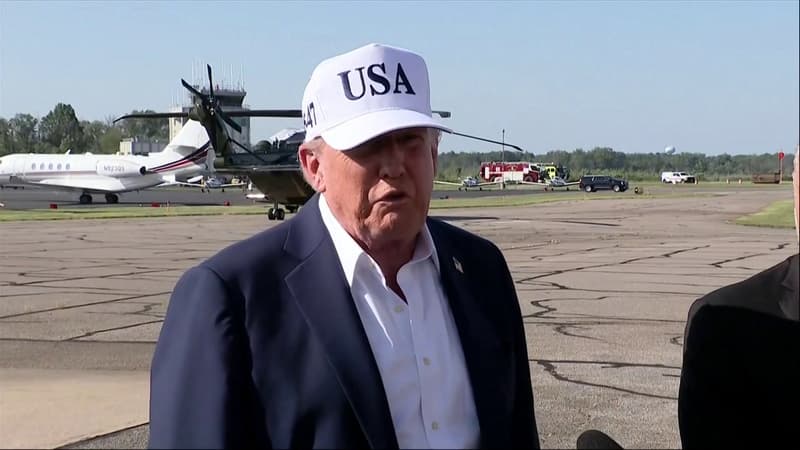It is a letter that would have gone well. The US president, Donald Trump, was distilled during the day, on his social social platform, 14 almost identical letters sent to several capitals, from Tunisia to Bangkok through Astana.
The manager promised on Monday a customs surcharge of at least 25% to several countries, including Japan and South Korea, a new stage in its overwhelming offensive international economic exchanges.
The amount of surcharge that intends to apply to its products, from August 1, varies: from 25% (Japan, South Korea, Tunisia in particular) to 36% (Cambodia and Thailand) and up to 40% (Laos and Burma).
The letters emphasize that if the goods are sealed from these countries, but in reality they come from other places, a higher “higher” surcharge will be applied, without the given amount.
It also ensures that any response will be sanctioned by an additional surcharge of the same magnitude.
Customs duties, paid by importers, will probably add prices in the American soil.
Donald Trump announced that he would send a first series of 12 to 15 cards on Monday, as many commercial partners, mentioning the surcharge that is intended to establish its products.
He had previously scheduled the entry into force of these additional customs rights on Wednesday, but postponed the deadline on August 1 through a presidential decree published Monday night.
Part of the ads were made while the New York Stock Exchange was open. Wall Street ended without collapsing.
Your deficits
From his return to the White House in January, the Republican billionaire has made customs rights a central axis of its economic policy: negotiation lever to obtain external concessions, a means to defend the national industry or the source of new public income.
He hates the idea that the United States has commercial deficits, that is, the amount of more goods from a country that does not export to this country.
Since April, he has threatened dozens of business of punitive customs to rebalance exchanges.
And it has already established a surcharge for 10% in most of the products that enter the United States and implemented specific customs duties in certain sectors (50% in steel and aluminum, 25% in the car).
No “emperor”
The United States Finance Minister Scott Besent, at the tip of the negotiations in Washington, said Monday on the CNBC television channel that “several agreements” would be announced “in the next 48 hours.”
“My message was full of new proposals (from the United States, editor’s note) yesterday (Sunday, editor’s note) at night,” he added.
During a meeting in Washington on Monday between Secretary of State Marco Rubio and the Minister of the National Security of South Korea, Sug-Lac, the United States said that a trade agreement with Seoul is concluded before August 1 for “nearby communication”, according to a statement from the Presidency of South Korea.
Thai interim prime minister Phumtham Wechayachai said Tuesday that he wanted a “better agreement” with the United States, that they threaten to apply a 36% surcharge in Thai products.
The European Union (EU) on Monday reported that a “good exchange” of telephone had held the previous day between the president of the European Commission, Ursula von der Leyen and Donald Trump.
Indonesia has announced that it promised to import at least one million tons of American wheat per year over the next five years, for an amount of $ 1.25 billion.
This has not rewarded the 32%surcharge, planned by Washington since April and confirmed Monday in Donald Trump’s letter.
The latter had announced an agreement with Hanoi last week, presented as favorable to US interests: a 20% surcharge in Vietnamese products (instead of 46% shown in April) that enters the United States, and in the exchange of customs “zero” in Vietnam on products from the United States.
The US president also threatened the countries of the BRICS Group (including Brazil, China, India, Russia and South Africa in particular), met in Rio de Janeiro, an additional surcharge of 10%, after criticizing their customs offensive.
The BRICs do not want an “emperor,” protested the Brazilian president Luiz Inacio Lula da Silva on Monday.
Source: BFM TV


